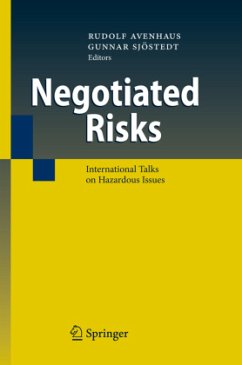This book fills a major gap in the risk literature, as it brings together two research strands: risks, to which IIASA's research programs have contributed significantly over the years, culminating in the Risk and Vulnerability Program, and international negotiations, on which there is an abundance of published work, much of it resulting from the work of IIASA's Processes of International Negotiations Program. Throughout the book, it is pointed out that there are actor-driven risks, namely those posed by international negotiations themselves, and issue-driven risks which are caused by large-scale human activities. In fact, negotiated risks deal with some of the most serious risks facing humanity: climate change, nuclear activities, and weapons of mass destruction. The book contains both scientific analyses on the nature of internationally negotiated risks and analyses of concrete risks, both of which are of immense practical relevance in the larger context of international negotiations.
The International Institute for Applied Systems Analysis (IIASA) has had risk as a research topic on its agenda right from its inception in 1972. Risk has played a - jor role in the Energy Program, with research being carried out both in-house and in cooperationwith other internationalinstitutions like the InternationalAtomic - ergy Agency (IAEA) and national research centers. Research areas were primarily the evaluationof all possible risks within one categoryof energysupply like nuclear ?ssion or fusion or fossil fuels and, even more important,the comparisonof risks of different energy-supplystrategies. Later on an independent program was started which still exists today under the name Risk and Vulnerability. There is a large amount of literature on risks to which IIASA's research programs have contributed signi?cantly over the years, and there is, of course, an abundance of published work on international negotiations, part of which is a result of the work of the Processes of International Negotiation (PIN) Program. There are, however, so far no studies on the combination of these two strands. Therefore, and as research on both topics is housed at IIASA, we are happy that our PIN Program has undertaken the dif?cult and important task of analyzing what the editors of this book have called negotiated risks.
The International Institute for Applied Systems Analysis (IIASA) has had risk as a research topic on its agenda right from its inception in 1972. Risk has played a - jor role in the Energy Program, with research being carried out both in-house and in cooperationwith other internationalinstitutions like the InternationalAtomic - ergy Agency (IAEA) and national research centers. Research areas were primarily the evaluationof all possible risks within one categoryof energysupply like nuclear ?ssion or fusion or fossil fuels and, even more important,the comparisonof risks of different energy-supplystrategies. Later on an independent program was started which still exists today under the name Risk and Vulnerability. There is a large amount of literature on risks to which IIASA's research programs have contributed signi?cantly over the years, and there is, of course, an abundance of published work on international negotiations, part of which is a result of the work of the Processes of International Negotiation (PIN) Program. There are, however, so far no studies on the combination of these two strands. Therefore, and as research on both topics is housed at IIASA, we are happy that our PIN Program has undertaken the dif?cult and important task of analyzing what the editors of this book have called negotiated risks.

